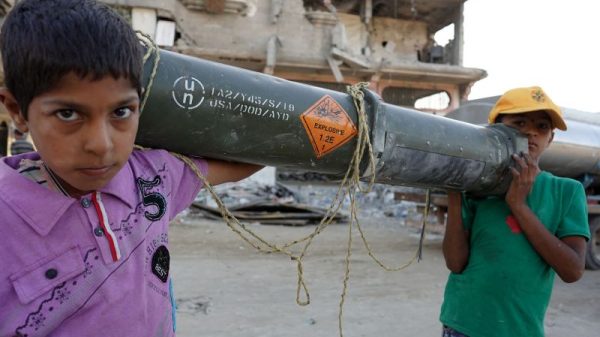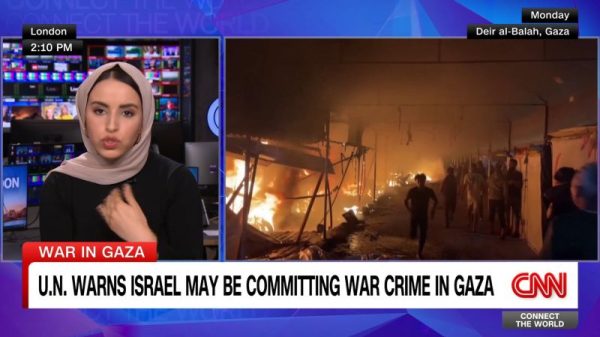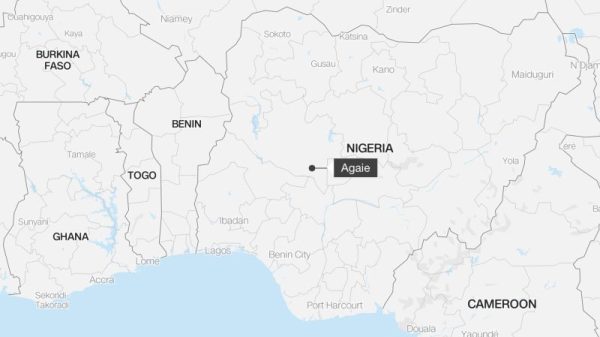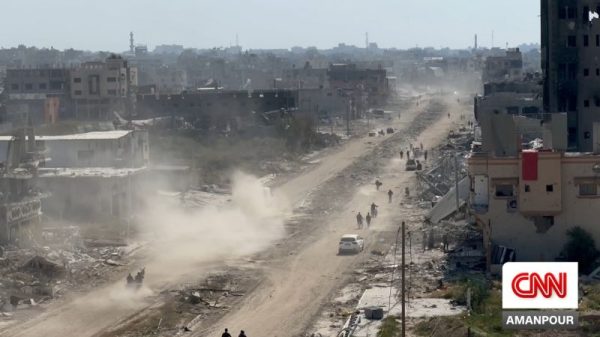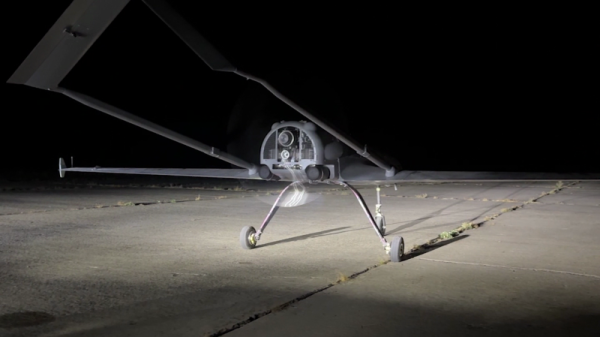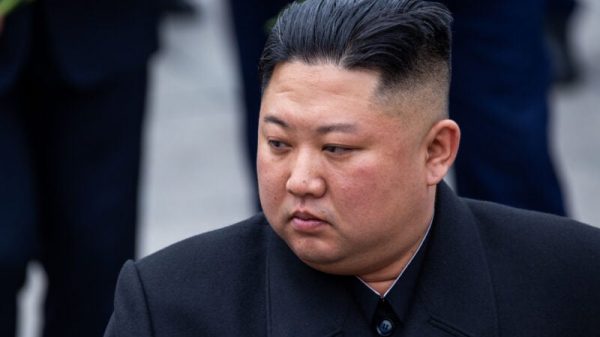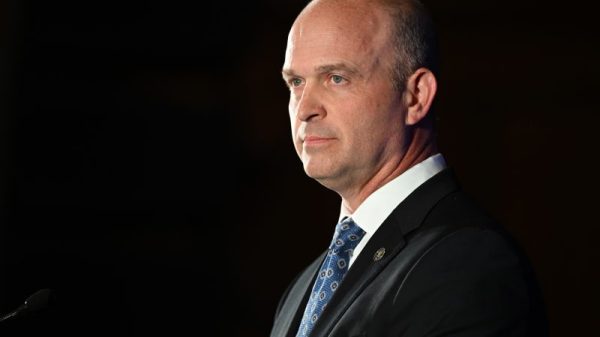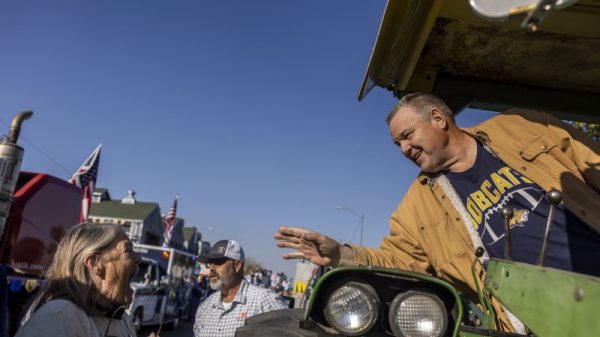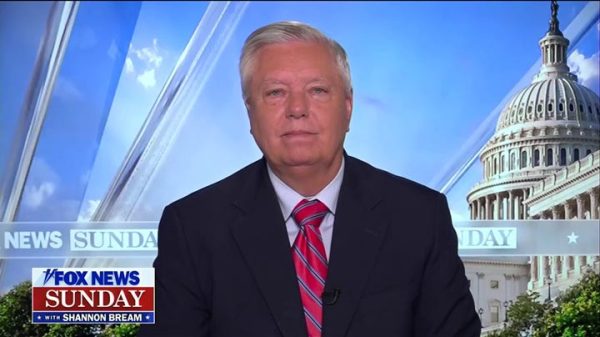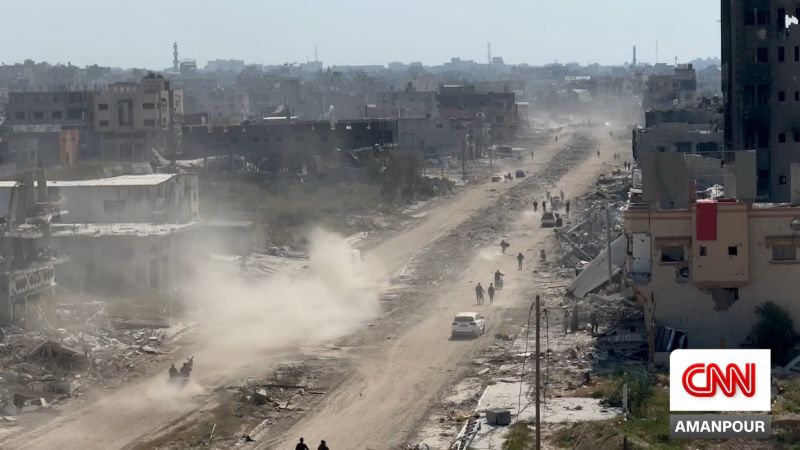In one of Gaza’s last standing hospitals, Tamara Al-Maarouf’s eyes well up with tears as she stands helplessly by her baby boy’s hospital bed. A tumor, now removed, has been compressing the 4-month-old’s tiny heart and he desperately needs treatment abroad.
Meanwhile, 84-year-old Oded Lifschitz, who was kidnapped from his home in Kibbutz Nir Oz on October 7 last year by Hamas militants, is still being held hostage in the enclave. His family is still desperately trying to bring him home.
The stories of two lives, those of a Palestinian infant and an elderly Israeli man, tell the tragic tale of the countless innocent lives trapped in a war they did not choose. Their fates are now tied up in politics and negotiations that have all but failed.
The baby, Jihad, can barely breathe or feed. His mother, Tamara, struggles to find ways to comfort him as he cries and wriggles around, with tubes sticking out of his mouth and nose.
Like thousands of other patients in Gaza, he is in urgent need of foreign medical treatment, but these evacuations have all but ceased since May, when Israel took control of the Rafah border crossing.
Israeli authorities have only allowed a fraction of the estimated 12,000 Palestinians awaiting transfer – many of whom are children – to leave Gaza for treatment.
More than a year of devastating Israeli strikes and the accompanying siege of the enclave have decimated the health sector, leaving medical workers with very little with which to save lives. Hospitals are not only overwhelmed with those injured in the conflict, but they’re now dealing with preventable diseases that are spreading at an alarming rate.
In August, an 11-month-old boy became the first person in Gaza in 25 years to be diagnosed with polio after Israel’s military campaign destroyed water and sanitation systems, leading to a resurgence of the deadly disease.
In September, the World Health Organization administered the first of two doses of the polio vaccine to more than half a million children aged below 10 in Gaza, with the second round of the emergency vaccination drive now under way, according to the UN children’s agency, UNICEF. The UN said it cancelled vaccinations at one school being used as a displacement shelter after it was damaged by an Israeli airstrike.
And there are many like Jihad who are suffering from serious conditions, chronic illnesses and cancer who cannot be appropriately treated in Gaza.
Her parents were longtime advocates for peace. In recent years, the elderly couple were part of a volunteer group of Israelis who would drive Gazans from the border to hospitals in East Jerusalem and the West Bank for treatment. Her father, Oded Lifschitz, kept his driving license so he could continue these missions, she said.
On the morning of October 7 last year, Oded and Yocheved were kidnapped from their home in Kibbutz Nir Oz, the site of one of the worst massacres of the Hamas attack on that day.
Yocheved, now 86, was abducted while still in her nightgown, thrown onto the back of a motorbike and taken to Gaza. At the end of October, she was released by Hamas on humanitarian grounds.
The last time Yocheved saw her husband of more than 60 years was last October 7. He was lying on the ground injured, after he was shot in the hand by the militants who stormed their home.
It is that kindness and generosity, as well as his ability to speak Arabic, that the family hopes will have helped a frail, elderly man with medical conditions survive in captivity.
They have now been waiting for his return for over a year. In May, Oded turned 84 in Hamas captivity.
Lifschitz wears a dog tag around her neck with a photo of her father and “84” engraved on it, along with the message, “Waiting for you at home.”
“Hamas took elderly, elderly people; they did not need them, and they could have returned them without a deal,” Lifschitz said. “There is no deal needed to return an 84-year-old man. There is no deal needed to return a 1-year-old baby. The fact that Hamas is using them to reach a deal is horrific.”
But Lifshitz, like many Israelis, still believes the only way out of this nightmare is a deal between Israel and Hamas that would stop the war and secure the release of the hostages.
She fears they are losing what feels like a race against time to bring them home alive.
“We are so exhausted and so heartbroken again and again,” Sharone said. “We are not giving up. We do not have the luxury of giving up.”
Hopes for a ceasefire deal and hostage release deal have been shattered repeatedly by failing negotiations. Both Israel and Hamas have blamed each other for derailing the efforts, leaving mediators from the United States, Qatar and Egypt scrambling to save talks that have stalled for months.
Hanging in the balance are the lives of more than 100 Israeli hostages and Gaza’s population of 2.2 million, all trapped in a besieged enclave that has become a “hell on Earth,” according to aid agencies which have been pleading for a ceasefire to save lives.
Those who survive Israel’s bombardment, which has killed more than 42,000 people, according to Palestinian authorities, face what Gaza residents like al-Maarouf describe as a slow death under siege, with conditions growing more catastrophic by the day.
Lifschitz said she thinks the mediators could do more to get a deal done. She wants Egypt and Qatar to put more pressure on Hamas but, for her, it is US President Joe Biden who could make this deal happen.
“I believe it is President Biden at this very moment that must do what it takes to bring them back home… I believe he is our best hope,” she said.
Lifschitz refuses to compare her own government’s position to that of a militant group like Hamas, but said: “Anybody who is interested in history sees people that are caught in the tide of time and political and military fanatical regimes that are putting their own agenda above human lives… Both nations are incredibly unlucky in the leaders that are guiding them at the moment.
For Israelis like Lifschitz, the race to save the lives of their loved ones took a more urgent turn in early September after the Israeli military retrieved the bodies of six hostages executed by Hamas.
The Israel Defense Forces (IDF) said they had been “brutally” murdered “a short while” before Israeli troops were able to reach them. Hamas, meanwhile, issued a chilling threat that more hostages would return in coffins if Israeli forces tried to rescue them.
These were young people who had every chance of survival, and they survived for almost a year,” said an emotional Lifschitz. “It is a failure; we have failed them.”
The families of hostages fear for the safety of their loved ones, not only in relation to their captors, but also Israeli military operations, not least the relentless bombardment that has flattened much of Gaza.
Last month, the IDF confirmed that three hostages whose bodies were recovered in December were “most likely” killed in an Israeli strike. The military had previously admitted mistakenly shooting and killing three other hostages last year and said it was investigating the circumstances of the deaths of six hostages whose bodies were recovered in June.
While prospects of an agreement appear bleak, Lifschitz said she would not stop fighting for the release of her father and the other hostages.
Asked what she would tell her father if he could hear her, Lifschitz said, choking back tears: “Forgive us. Forgive us. We have tried so hard. And know that we hear your voice in our heads… You know, we tried the way he tried all his life. He tried for many years to avert this disaster.
“I hear him now saying, ‘work for peace, work for the possibility of humans in this region to live together,’” she added.






